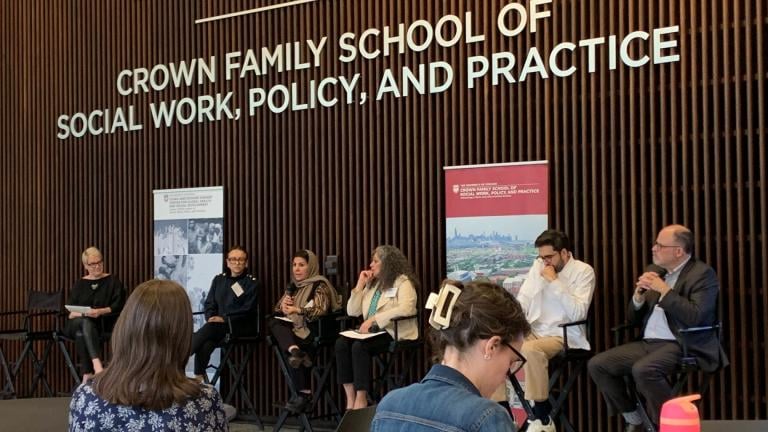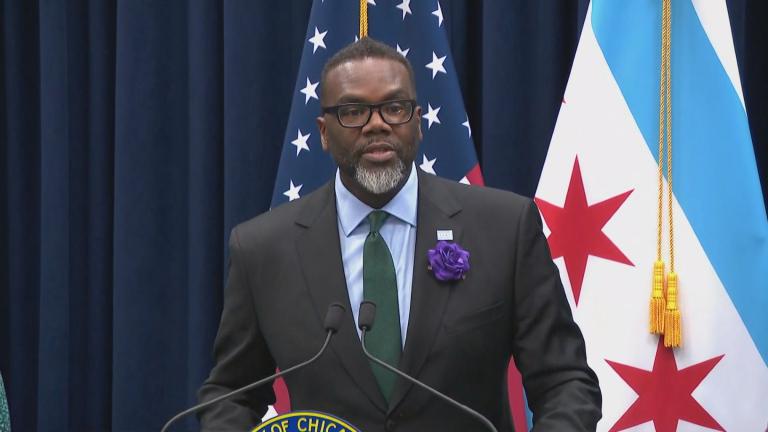Chicago officials declined on Thursday to confirm whether they plan to evict from city shelters thousands of men, women and children sent to Chicago from the southern border, even as health officials scrambled to cope with an apparent measles outbreak in the city’s largest shelter.
The lack of clarity means that the fate of as many as 5,600 migrants who are set to exhaust limits first imposed by Mayor Brandon Johnson in November — but then extended three times in January and February — remains in flux, less than 48 hours before Saturday’s deadline.
A spokesperson for Johnson said conversations were ongoing Thursday morning about whether the limits would be enforced. Communications Director Ronnie Reese declined to answer detailed questions from WTTW News about how many people are set to be evicted from the city’s 23 shelters.
Ald. Andre Vasquez (40th Ward), the chair of the City Council’s Committee on Immigrant and Refugee Rights, said members of the Johnson administration told him Wednesday afternoon that a decision to enforce the limits on shelter stays had not yet been made.
“There are so many unanswered questions,” Vasquez said, adding that the mayor’s plan to evict migrants from city shelters on a “broad basis to placate the xenophobic elements out there is not appropriate.”
Vasquez was the driving force behind a letter signed by 22 members of the City Council and the leaders of 40 community organizations helping to care for the migrants that urged the mayor to scrap the 60-day limit he imposed on shelter stays.
Johnson told reporters he is “very sympathetic” to those concerns, but blamed the federal government for the humanitarian crisis that has defined his first 10 months in office.
“This is a really jacked-up situation,” Johnson said. “My response to my colleagues is: This is an emergency temporary shelter. I don’t know how long this crisis is going to last. So we need the federal government and my colleagues to send in a letter with me to get the federal government to pass a law to check (Texas) Gov. (Greg) Abbott. Because that is the real crisis: An out-of-control tyrant, a petulant one at that.”
Nearly 37,100 migrants, all of whom are in the country legally after requesting asylum, have made their way to Chicago as part of an effort by Texas Gov. Greg Abbott, a Republican, to damage President Joe Biden’s chances for reelection and divide Democratic voters.
Since the beginning of February, Chicago officials have closed five city-run shelters as the number of migrants arriving in Chicago slowed and the pace of people finding permanent housing increased. More than 11,200 people were living in 23 city facilities as of Thursday, a 25% drop since mid-December, the most recent peak of the humanitarian crisis facing Chicago.
Video: Joining “Chicago Tonight: Latino Voices” are Emilio Araujo, director of development and communications for Onward House; Ald. Byron Sigcho Lopez (25th Ward); and Mimi Guiracocha, DNP, R.N., a public health nurse and mutual aid volunteer. (Produced by Emily Soto)
It is unclear how many people, if any, will be evicted from the city’s migrant shelter in Pilsen, where 10 cases of measles had been confirmed as of late Thursday night. Two additional cases of measles have also been confirmed in Chicago, officials said. In all, six children and six adults have been diagnosed with measles.
Nearly 1,900 men, women and children sent to Chicago were living in the former industrial building at 2241 S. Halsted St. when the first measles case was diagnosed on Friday.
City officials have said those who are newly vaccinated or who are not vaccinated should remain in the shelter for 21 days, the incubation period for the infection, officials said. It is unclear how many people who otherwise would be evicted this weekend will be allowed to stay because they have been asked to quarantine.
State officials announced Thursday afternoon that 26 families, including 48 children, are quarantining at a Chicago-area hotel for 21 days to curb the spread of measles.
Those people have been exposed to measles but do not have measles or measles symptoms. The hotel is being used solely for temporary quarantine shelter and is not open to the public, officials said.
Johnson gave no indication on Wednesday at an unrelated news conference that he was prepared to issue a fourth reprieve to the 60-day limit while defending the policy.
“The ultimate goal is to move people to resettlement or out-migration,” Johnson said. “What this policy has essentially done, it has given us the opportunity to have real substantive conversations with migrants to help them move on.”
Migrants evicted from a city shelter can return to the designated “landing zone” for buses from Texas at Polk and Desplaines streets in the West Loop, according to the policy imposed by Johnson.
Pressed by reporters, Johnson said he did not know how many migrants were on the verge of being evicted from city shelters.
“I don’t know if it’s a substantial number, but again, they can return to the loading zone,” the mayor said when asked about how many migrants must leave the shelters. “That’s one place, or they can decide to move on. You know, they don’t necessarily have to remain within the structure that we’re providing.”
The group of people who faced eviction from city shelters at the beginning of February likely included 1,700 children, who could have to change schools in the middle of the academic year.
Brandie Knazze, the commissioner of the Department of Family and Support Services, said Jan. 29 that officials “will make every effort to limit disruption, and mitigate harm, especially for school-aged children.”
Contact Heather Cherone: @HeatherCherone | (773) 569-1863 | [email protected]








